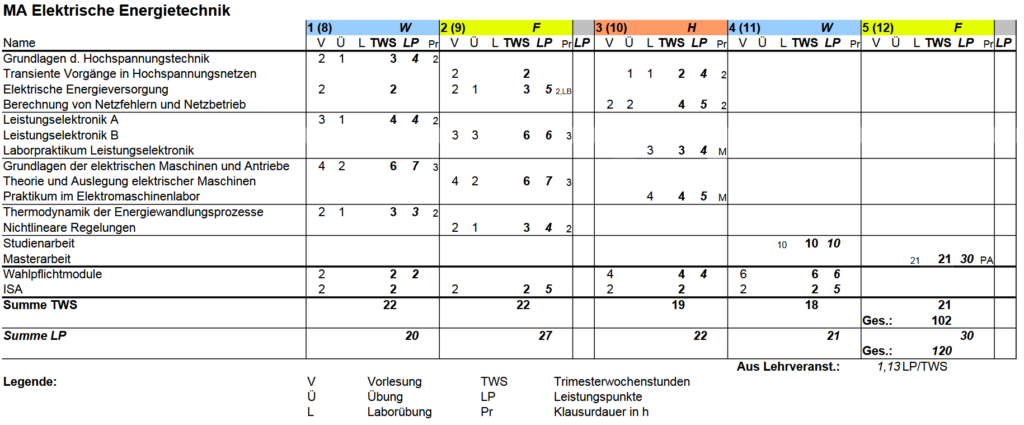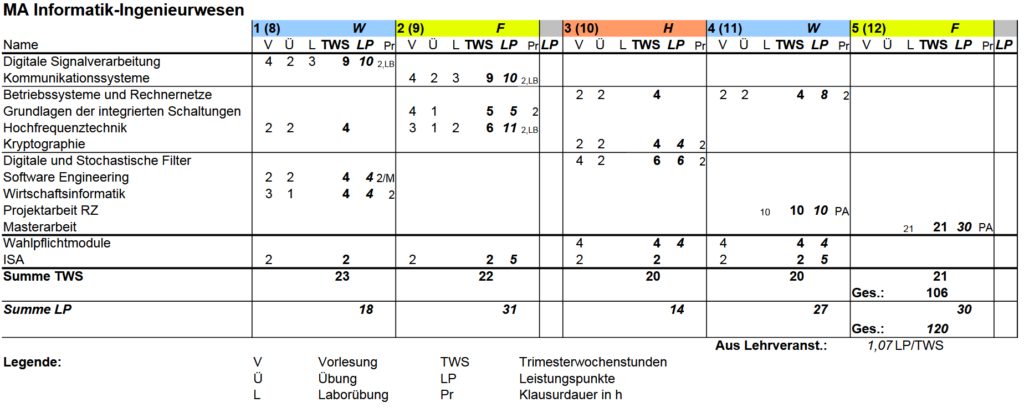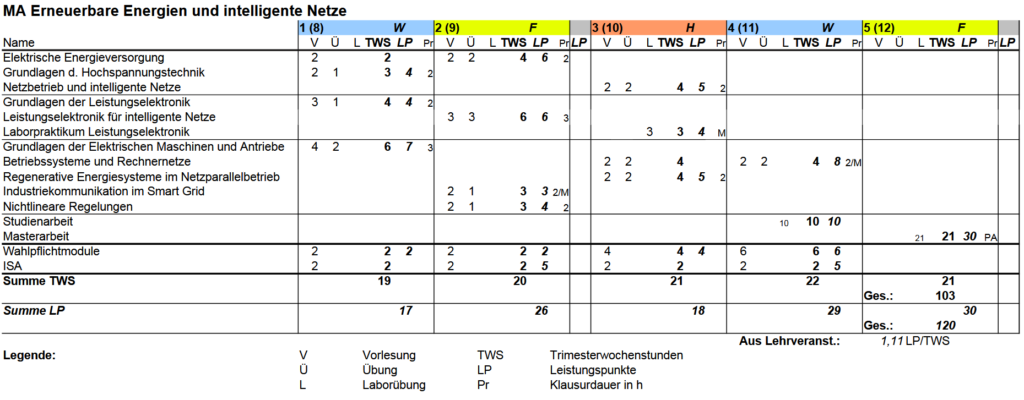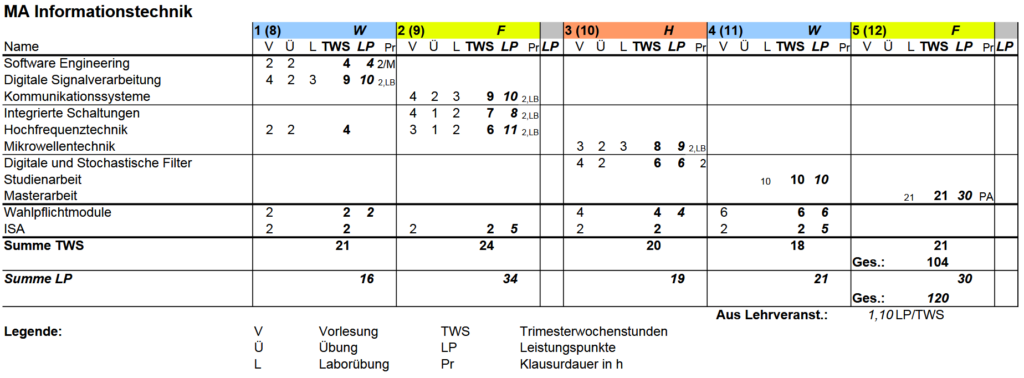- Electrical Power Engineering (M. Sc.)
- Renewable Energies and Smart Grids (M. Sc.)
- Computer Engineering (M. Sc.)
- Information Technology (M. Sc.)
Electrical Power Engineering (M. Sc.)
The master’s program in electrical power engineering covers the important topics of electrical power generation and distribution as well as power electronic and electro-mechanical power conversion.
The subject area of electrical energy systems covers both conventional energy generation through the combustion of fossil fuels and regenerative energy generation through wind power and photovoltaics. Furthermore, the transmission and distribution of electrical energy via overhead lines and high-energy cables is part of this module. To minimize transmission losses, very high DC and AC voltages are used for energy transmission. The technical challenges resulting from this, among other things with regard to insulation and protection technology, are dealt with by high-voltage technology.
Power electronics uses special semiconductor components to convert electrical energy into various manifestations. The structure, mode of action and operating behavior of electrical machines are taught through modules from the Electrical Machines and Drives department. Based on the basic laws of physics, generators, transformers, motors and actuators are analyzed and the specific characteristics are developed.
Further modules such as thermodynamics of energy converters as well as nonlinear controls round off the training.
In the master’s program in Electrical Power Engineering, students acquire broad-based competencies for solving tasks in the field of modern electrical power engineering, as it is applied today, for example, in every modern wind turbine, every electric drive and in every computer.
Modulhandbuch: Elektrische Energietechnik (M.Sc.) (Intranet)
Modulhandbuch: Elektrische Energietechnik (M.Sc.) (Stand 05/22)
Computer Engineering (M. Sc.)
Information, information gain, information transfer, as well as the ability to process huge amounts of data (Big Data) form the operational factor “information space”, which is of crucial importance in the economy and in the military sector.
In this space, it is essential to develop leads, gain knowledge, act with little delay and reliability, and effectively counter the damaging effects of IT attacks. The tools for this are computer networks and the distributed applications operated on them.
Computer science engineering is a degree program from the field of applied computer science. It encompasses the engineering sciences of mechanical and electrical engineering as application areas with a focus on IT management and IT security.
For this purpose, the course is divided into the sub-areas of structure of IT systems, application of IT systems, management of IT systems, and engineering fundamentals, which are taken from the bachelor’s degree program in electrical engineering.
In the area of structures of computing systems, the areas of computer architecture, computer technology and computer networks are covered.
The application of IT systems ranges from the ability to program in a higher programming language (e.g. C) to software engineering, operating systems and databases to cryptography. The management of IT systems deals with the administrative part of operating systems and computer networks, as well as the structures, roles and processes in a modern data center. In addition, a practical course on setting up and operating a data center is offered. All subareas are considered under the special aspect of IT security.
Modulhandbuch: Informatik-Ingenieurwesen (M.Sc.) (Intranet)
Modulhandbuch: Informatik-Ingenieurwesen (M.Sc.) (Stand 05/22)
Renewable Energies and Smart Grids (M. Sc.)
One of the most important current and future fields of engineering is the transition to a sustainable energy supply with renewable energies. With their use, fuel resources are conserved, environmental protection is improved and the impact on the climate is minimized.
The master’s program in Renewable Energies and Smart Grids provides the necessary skills for this. First, conventional and renewable energy converters are covered in the modules Fundamentals of Electrical Machines and Drives, Power Electronics and Electrical Power Supply.
Problems caused by forecast inaccuracies, steep power increases, periods of low energy supply, and periods of surplus electrical energy. Approaches to solving these problems are the expansion of the electrical grid, energy storage, flexible power generation, and control of consumption. To optimally match these options, the electrical load flow must be controlled according to modified rules. To this end, electrical grids are being equipped with new types of measuring devices and sensors. They are thus becoming intelligent networks (smart grids).
The number of electrical consumers in the electrical networks of motor vehicles, ships and aircraft is also rising sharply, increasing the complexity of these systems. The components electric generator, fuel cell or battery, power distribution and consumers must be technologically coordinated and controlled together.
Students acquire the skills to solve all these tasks in the modules High Voltage Technology, Grid Operation and Smart Grids, Operating Systems and Computer Networks, Measurement Technology for Smart Grids, Power Electronics for Smart Grids, Nonlinear Controls, and Regenerative Energy Systems in Grid Parallel Operation.
Modulhandbuch: Erneuerbare Energien und intelligente Netze (M.Sc.) (Intranet)
Modulhandbuch: Erneuerbare Energien und intelligente Netze (M.Sc.) (Stand 05/22)
Information Technology (M. Sc.)
Whether we are calling someone, sending an e-mail or using a web application, communication networks are always used to transport the required data around the globe quickly, securely and reliably, invisibly to the user.
Information technology forms the basis for the design, implementation and operation of the global Internet.
Information technology consists of the subfields of digital signal processing, communication systems, integrated circuits and high-frequency technology and deals with the planning, design and implementation of complex systems for the transmission of information via heterogeneous transmission media (cable, radio).
An essential task of information technology is the acquisition and processing of multimedia signals (voice, audio, video, sensor signals) and their transmission via mobile networks, satellite systems or computer networks such as the global Internet. Digital Signal Processing deals with methods for coding, estimation and classification of signals as well as system identification. Software engineering and the use of various programming tools form the foundation for the efficient realization of these procedures in the form of software algorithms.
The combination of digital signal processing and message theory is used to design and build digital communication systems.
and build them. The fact that electronic devices – especially in the field of mobile communication – are becoming smaller and more powerful is largely due to the rapid development in the field of integrated circuits.
New technologies and manufacturing methods make it possible to integrate more and more components on one chip. In the process, both analog and digital circuits are integrated to form complex systems. High-frequency and microwave technology, the classic fields of information technology, focus on harnessing electromagnetic waves for information transmission.
Recent development is characterized by the opening up of ever higher frequencies in the gigahertz range for wireless communications. Optical communications technology plays a decisive role as the basic technology for the global Internet.
It makes it possible to bridge distances of over 30,000 km.
Modulhandbuch: Informationstechnik (M.Sc.) (Intranet)
Modulhandbuch: Informationstechnik (M.Sc.) (Stand 05/22)
Modulhandbuch: Master-Wahlpflichtmodule (Intranet)
Modulhandbuch: Master-Wahlpflichtmodule (Stand 05/22)
Allgemeine Prüfungsordnung (APO )
Letzte Änderung: 1. August 2022



